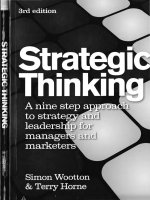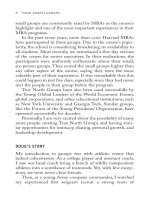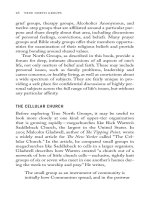True North Groups A Powerful Path to Personal and Leadership Development BK Business_1 doc
Bạn đang xem bản rút gọn của tài liệu. Xem và tải ngay bản đầy đủ của tài liệu tại đây (286.99 KB, 20 trang )
TRUE NORTH GROUPS
-
Authentic Leadership: Rediscovering the Secrets to Creating Lasting
Value ()
True North: Discover Your Authentic Leadership ()
(with PeterSims)
Finding Your True North: A Personal Guide ()
(with Andrew McLean and Nick Craig)
7 Lessons for Leading in Crisis ()
TRUE NORTH
GROUPS
A Powerful Path to Personal and
Leadership Development
Bill George and Doug Baker
True North Groups
Copyright © 2011 by Bill George and Doug Baker
All rights reserved. No part of this publication may be reproduced, distrib-
uted, or transmitted in any form or by any means, including photocopying,
recording, or other electronic or mechanical methods, without the prior writ-
ten permission of the publisher, except in the case of brief quotations
embodied in critical reviews and certain other noncommercial uses permitted
by copyright law. For permission requests, write to the publisher, addressed
“Attention: Permissions Coordinator,” at the address below.
Berrett-Koehler Publishers, Inc.
235 Montgomery Street, Suite 650
San Francisco, California 94104-2916
Tel: (415) 288-0260, Fax: (415) 362-2512
www.bkconnection.com
Ordering information for print editions
Quantity sales. Special discounts are available on quantity purchases by cor-
porations, associations, and others. For details, contact the “Special Sales
Department” at the Berrett-Koehler address above.
Individual sales. Berrett-Koehler publications are available through most
bookstores. They can also be ordered directly from Berrett-Koehler: Tel:
(800) 929-2929; Fax: (802) 864-7626; www.bkconnection.com
Orders for college textbook/course adoption use. Please contact Berrett-
Koehler: Tel: (800) 929-2929; Fax: (802) 864-7626.
Orders by U.S. trade bookstores and wholesalers. Please contact Ingram
Publisher Services, Tel: (800) 509-4887; Fax: (800) 838-1149; E-mail:
customer .service@ingram publisher services .com; or visit www .ingram
publisher services .com/ Ordering for details about electronic ordering.
Berrett-Koehler and the BK logo are registered trademarks of Berrett-Koehler
Publishers, Inc.
First Edition
Paperback print edition ISBN 978-1-60994-007-2
PDF e-book ISBN 978-1-60994-008-9
IDPF e-book ISBN 978-1-60994-009-6
2011-1
Project management and design by Valerie Brewster, Scribe Typography.
Copyediting by Todd Manza. Proofreading by Don Roberts. Index by George
Draffan. Cover image: istock © Stephen Strathdee.
This book is dedicated to the members of our men’s group
and our couples group who have shared with us
so much of themselves, their wisdom, their caring,
and their love for so many years.
This page intentionally left blank
vii
CONTENTS
Foreword ix
Preface xiii
Finding Depth and Intimacy in Your Life
True North Groups
Your Personal and Leadership Development
Forming Your Group
Norming
Storming
Performing
Reforming Your Group
viii
Why Your True North Group Is Important
in Your Life
Start-Up Curriculum (First Twelve Topics)
Additional Program Ideas
The Group’s Initial Meeting
Member Contract
Meeting Formats
Ground Rules for Group Discussions
Guide for Facilitating Groups
Member Satisfaction Survey
Group Retreats
Adding New Members toExistingGroups
Giving and Receiving Feedback
Research Process
Notes
Bibliography
Acknowledgments
Index
About the Authors
The True North Groups Institute
ix
FOREWORD
many, many books come across my reading table
each year, but it has been a long time since one of them
impressed me so much as this one has. It is a wisdom guide
to help us to look deeper, to honor the essential and sacred
traditions of living communities, and to take this “one wild
and precious life” seriously.¹
We are storytelling animals. As our hunter-gatherer ances-
tor s sat around the fi re carving arrows and eating berries,
they told stories which in time were woven into the tapes-
try of daily life. These stories were the fi rst encyclopedia of
human knowledge. They explained where the world came
from, why there are people, and why the gods put fi re and
death on earth. Stories told the people of a tribe who they
were, where they had been, where they were going, and how
to stay friendly with the spirits.
For over thirty years I have explored, researched, written
about, and been invited to speak about how we shape our
stories into more purposeful lives. Lately, more people have
been asking if and how I am shaping my own story and what
helps me sustain a purposeful journey day by day through-
out the year.
I always fi nd myself realizing that I could never live pur-
posefully without my “tribe”
—
people who are on a shared
path with me. By tribe, I mean people who truly “get me” and
understand and refl ect back to me my true story. They know
how to pose a powerful question and are rarely reluctant to
ask it. It is their curiosity that keeps me curious and alive.
To be a person is to have a story to tell. We become
grounded in the present when we color in the outlines of the
past and the future. Within each of us there is a tribe with a
x
complete cycle of stories. It is impossible to create a mean-
ingful life alone. In truth, we do little completely alone. We
depend on a living community
—
a true north group
—
to
accompany us each step of the way. We might see ourselves
as self-suffi cient, which I often do, but we ignore the essen-
tial, life-giving companionship upon which our very lives,
livelihoods, and longevity depend.
Bill and Doug clearly show us how to create that liv-
ing community. They ask us wise questions and show us the
practices that lead us to our own answers. There is one ques-
tion in particular that I fi nd very compelling in my work as
an executive coach: “What are you up to?” Bill and Doug
believe, as I do, that each of us is up to something very spe-
cial with our lives. They believe that each of us is born with a
unique gift and a sacred duty to fulfi ll its promise.
This gift, for each of us, is the pathway to a meaning-
ful life. It is the pathway to our livelihood
—
our life’s work.
All of life is viewed as a quest to answer the core true north
question, “What are you up to?”
Many of us at various points in our own lives are a little
vague about what we’re up to. Maybe even utterly confused.
Poet Mary Oliver poses the question in another way:
“Tell me, what is it you plan to do with your one wild and
precious life?” Wild and precious? Do you refl ect, as I do,
that you may not be living up to your precious possibilities
in life?
Doug and Bill have been living with this and similar
questions for many years! Perhaps this is why they created
their own True North Group over thirty years ago.
But this book is not about Doug and Bill; it’s about you.
So, can we dig a little deeper? What is a “wild and precious
life” to you? And how does it diff er from your current life?
Let’s face it: just getting through life today with some
semblance of success is a major feat. Many of us, however,
xi
spend less than percent of our precious time engaged
in what might be called meaningful activity
—
talking with
friends about what matters, observing spiritual practices,
helping others, or performing meaningful work. It doesn’t
have to be that way. Our precious lives don’t have to be dom-
inated by busyness.
We may fi nd ourselves on diff erent paths, but it’s essen-
tial that we are on diff erent paths together. Isolation is fatal!
It’s important that we don’t tackle life alone. The gift is free.
But its expression requires support. And that’s the essence of
a True North Group
—
to share the path in helping us claim
our gift and heed our calling.
Still, it takes no small courage to be willing to seek com-
pany on our journey
—
to ask to be accompanied. For many
years I belonged to a circle of a dozen men who called them-
selves the Junto. Patterned after Benjamin Franklin’s group
of the same name, we met nine times a year to exchange
stories from our journeys and to share our challenges and
blessings.
The magic of the Junto was due to the simple discovery
that everyone yearned to share his story. When we tell our
stories to one another, we
—
at one and the same time
—
fi nd
the meaning of our lives and are healed from our isolation
and loneliness. Many religious traditions honor this essential
practice. Likewise, many indigenous peoples honor this prac-
tice, realizing that they cannot possibly do the work of living,
surviving, and healing alone.
We can’t truly tell who we are unless someone is listen-
ing. Strange as it may seem, self-knowledge begins with self-
revelation. We don’t know who we are until we hear ourselves
speaking the story of our lives to someone we trust to listen
with an open mind and heart.
In my coaching work, I have rarely encountered a person
who was not able to uncover the power of their individual
xii
purpose in a True North–type group and, having made that
discovery, to fi nd the possibility of truly living up to their
wild and precious possibilities. Bill and Doug have made an
important contribution indeed to that discovery process.
Richard Leider
Best-selling author of e Power of Purpose and
Repacking Your Bags
xiii
PREFACE
since 1975, we have been actively involved in
small, personal groups that serve as the inspiration and the
basis for True North Groups. True North Groups comprise
six to eight peers who meet on a regular basis to discuss the
important questions of their lives and to support each other
during diffi cult times.
These groups have been a godsend in our lives and in the
lives of hundreds of people we know. They have helped us
navigate personal challenges with our families, our careers,
and our health. They have provided a forum for addressing
life’s most diffi cult questions about our beliefs, our values,
and the meaning and purpose of our lives.
Over the years we have frequently been asked by friends
and acquaintances, “How can I form such a group?” Origi-
nally, we set out to write a book to answer that question, a
“how to” manual for creating True North Groups, as both of
us do in our work these days.
As we interviewed a wide range of people participat-
ing in groups and studied the small-group movement in its
larger sociological context, however, we recognized there is a
much greater need for these groups and that they are part of
a broader societal shift toward forming small groups. Thus,
we expanded our focus to looking at the essential role True
North Groups can play in human growth and leadership
development and in fi lling the void that many of us feel in
our lives.
We believe there is a unique role for personal, intimate
groups that diff ers from the multitude of groups formed for
specifi c purposes. By providing a safe place for deep, intimate
discussions about life’s most challenging questions, True
xiv
North Groups enable us to become fully human and more
fully alive, awakening to the enormous possibilities within
each of us. They are the best vehicle we know for helping us
develop as human beings and as leaders. In a world where the
diffi culties we face every day often feel overwhelming, True
North Groups provide a powerful path between our personal
lives and the organizations we participate in.
This book is written for you, if you are interested in form-
ing such a group. Or perhaps you want to enable your cur-
rent group to have deeper and more meaningful discussions
about the vital questions of life. It off ers you a deeper under-
standing of the vital role a True North Group can play in
your life and how you can form one. It shows how to create
sound norms that enable the group to navigate successfully
through the inevitable storms that all groups encounter and
to emerge as a high-performing group.
It is our hope that your experiences with your groups will
be as meaningful and rewarding as ours have been.
Bill George and Doug Baker
Minneapolis, Minnesota
April
INTRODUCTION
Finding Depth and
Intimacy in Your Life
we yearn to share the stories of our lives and
to have honest conversations with people we trust. Have you
ever felt alone in a crowd? Were you eager to abandon the
superfi cial conversations and share your authentic self and
your feelings without fear of being judged?
We need people around us to whom we can look for sup-
port and advice, who can help us develop as human beings.
We need them to help us become better leaders in our work,
our communities, and our families. We want to be open and
vulnerable, but who can we rely on to have our best interests
at heart and maintain our confi dentiality? Where can we fi nd
this kind of depth, intimacy, and support in our lives? Who
do we talk to when we have great joy or sorrow in our lives or
are facing diffi cult decisions?
The challenges we face these days are so great that we
cannot rely entirely on ourselves, our communities, or our
organizations to support us and help us stay on track. We
need a small group of people with whom we can have in-
depth discussions and share intimately about the most
important things in our lives
—
our happiness and sadness,
our hopes and fears, our beliefs and convictions.
We call these groups True North Groups because they
help us follow our True North. As Bill wrote in his book by
that name, True North represents what is most important to
us in life: our beliefs, our most cherished values, our passions
and motivations, and the sources of satisfaction in our lives.
True North is the orienting point that keeps us on track as
human beings and as leaders. It represents who we are at our
deepest level.
Most of us know what our True North is, but we are con-
stantly pressured by external forces to deviate from it. Or we
are seduced by extrinsic rewards like money, power, and rec-
ognition that cause us to detour from our True North.
We created True North Groups to address our need for a
support team to enable us to get through challenging times
and to be there for us in good times and bad. By bridging the
gap between our individual lives and the organizations and
communities we engage every day, True North Groups can
help us fi nd joy and fulfi llment in our lives. They can help
us develop as authentic leaders who can make a diff erence in
our world.
Before digging into what a True North Group is and why
you would want to join one, we would like to share our sto-
ries of how we got interested in small groups.
BILL’S STORY
All my life I have been passionate about leadership. From
observing leaders at a young age to leading business orga-
nizations and working with leaders committed to making a
diff erence, I’ve always wanted to be engaged with leaders and
with leading.
In my early years, I was never asked to lead anything, as I
was too eager to get ahead. In high school and college, I was
devastated as I lost seven consecutive elections, until some
older friends helped me get on track. After that, I had many
opportunities to lead organizations in college and graduate
school before plunging into the world of business. There I
spent ten years each at Litton Industries, launching the con-
sumer microwave oven business, and at Honeywell, in a vari-
ety of executive leadership roles. It wasn’t until that I
arrived at Medtronic’s doorstep, where I spent the best thir-
teen years of my professional career.
Following a weekend retreat in , Doug Baker and I
formed a True North Group. We didn’t call it that in those
days; instead, it was our “renewal group” that enabled us to
renew ourselves each week. In , we also formed a couples
group of eight that includes our spouses and two other cou-
ples who are close friends.
In addition to my wife, Penny’s, love and counsel, the peo-
ple in these two groups have done more to help me develop
as a whole human being and an authentic leader than any-
thing else in my life. They have helped increase my self-
awareness, sensitivity to others, and self-acceptance.
In the early years, they helped me recognize I was try-
ing so hard to get ahead that I was behaving very diff erently
in my work and community than at home and in my per-
sonal life. That led me to “decompartmentalize” my life by
attempting to be the same person at home, at work, and in
the community
—
with less facade and more authenticity.
When I hit the wall in my Honeywell career
—
some-
thing most of us have to confront at some point
—
our men’s
group helped me acknowledge that I was striving too hard
to become CEO and was in danger of losing sight of my
True North. Back in , I was on the fast track to the top
of Honeywell. Elected executive vice president in , I took
over a large organization where I discovered lots of problems
as I dug deeply into each of the businesses.
Just as we were getting these businesses in shape, I was
asked to take over a new set of businesses and get them
turned around. In late , I was given responsibility for the
third major turnaround, where we uncovered nearly
million in cost overruns on fi xed-price government contracts
that had to be written off .
One day in , I was driving home on a beautiful fall
day when I looked at myself in the mirror and realized I was
deeply unhappy. In that instant fl ash in the mirror, I recog-
nized that I was losing sight of my True North. I was striv-
ing so hard to get to the top that I was moving away from
being an inspirational, growth-oriented leader. When I told
Penny what I was feeling, she said, “Bill, I have been trying to
tell you that for the past year, but you didn’t want to listen.”
Often it is the people closest to us who see us as we are and
can recognize our blind spots.
The next morning I shared my feelings with our group.
They were helpful in confi rming the changes they had seen
in me and sharing their perceptions about my growing
unhappiness. They suggested I rethink the opportunity to
join Medtronic that I had turned down the previous summer.
Later that week, I called Medtronic back, which opened up
the best move of my career
—
one that I couldn’t see without
the help of my wife and my men’s group.
In , Penny was diagnosed with breast cancer. I’ll never
forget our couples group sitting together beneath the surgi-
cal room at Abbott Northwestern Hospital while she was
having her mastectomy. Even with that support, I strug-
gled to face the risks Penny faced and to share her fears. My
men’s group pointed out that I seemed to be in denial about
the uncertainty of her health, probably due to losing both
my mother and my fi rst fi ancée to cancer early in life. That
allowed me to stop trying to “fi x it” and to just be a support
person for Penny, an entirely new role for me.
Ten years ago, I concluded my business career and went
on a wilderness journey to contemplate what lay ahead.
Whatever I explored
—
from health care to international
relations, corporate governance, government service, and
education
—
my thoughts always came back to leadership.
Thanks to the trauma associated with the fall of Enron
and dozens of companies whose executives got them into
trouble, I found a new calling in helping others become
more authentic leaders
—
from my MBA students to CEOs.
Through this experience, I learned I could have greater
impact in helping others lead eff ectively than I could in
leading myself. As I wrote Authentic Leadership, True North,
and two other books on leadership, I realized that my the-
sis is always the same: we need a new generation of authen-
tic leaders to become values-centered leaders guiding great
organizations.
After retiring from Medtronic and spending two years
teaching in Switzerland and at Yale School of Manage-
ment, I joined the faculty of Harvard Business School in
to teach a new course called Leadership and Corporate
Accountability. I soon realized there was an absence of lead-
ership development courses for MBA students.
In interviewing leaders in – for True North and
reviewing transcripts from leaders, our research team
concluded that one of the keys to sustaining your leader-
ship is having a support team around you. In addition to
your spouse, partner, or mentor, we recognized that a support
group was the most important thing people could do to stay
grounded and increase their self-awareness.
In , I introduced a new elective course at Harvard
Business School called Authentic Leadership Development.
To encourage greater intimacy and more opportunities for
personal sharing, we created six-person groups, modeled
after our men’s group. These groups are identical to the True
North Groups described in these pages. The group meetings
are offi cial classes, accounting for percent of the course.
Unique in the Harvard Business School curriculum, these









